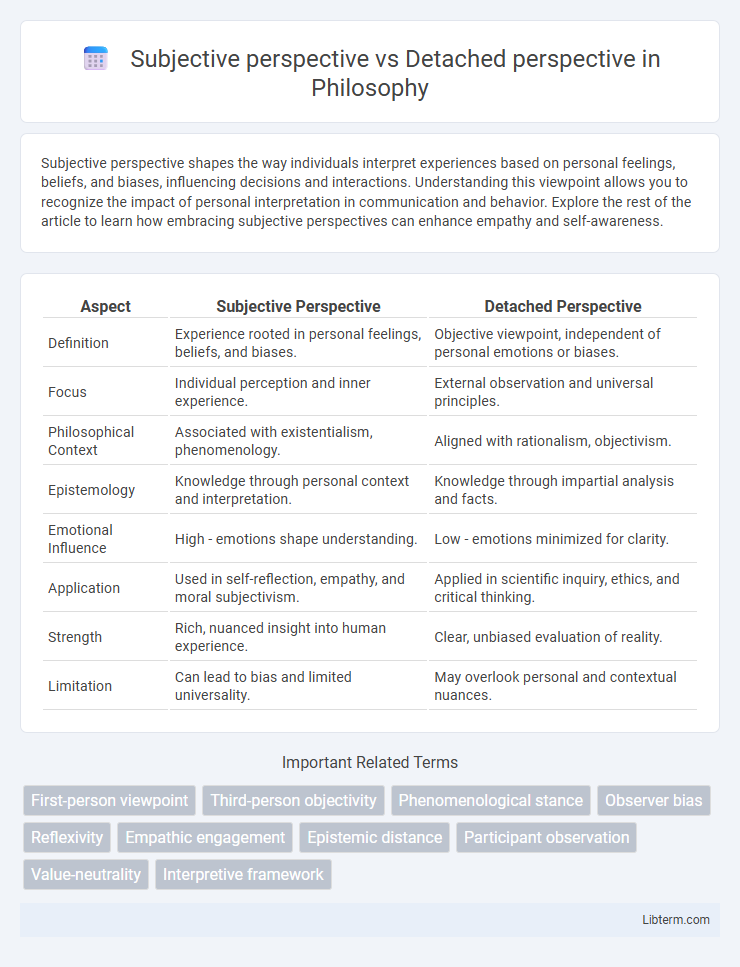Subjective perspective shapes the way individuals interpret experiences based on personal feelings, beliefs, and biases, influencing decisions and interactions. Understanding this viewpoint allows you to recognize the impact of personal interpretation in communication and behavior. Explore the rest of the article to learn how embracing subjective perspectives can enhance empathy and self-awareness.
Table of Comparison
| Aspect | Subjective Perspective | Detached Perspective |
|---|---|---|
| Definition | Experience rooted in personal feelings, beliefs, and biases. | Objective viewpoint, independent of personal emotions or biases. |
| Focus | Individual perception and inner experience. | External observation and universal principles. |
| Philosophical Context | Associated with existentialism, phenomenology. | Aligned with rationalism, objectivism. |
| Epistemology | Knowledge through personal context and interpretation. | Knowledge through impartial analysis and facts. |
| Emotional Influence | High - emotions shape understanding. | Low - emotions minimized for clarity. |
| Application | Used in self-reflection, empathy, and moral subjectivism. | Applied in scientific inquiry, ethics, and critical thinking. |
| Strength | Rich, nuanced insight into human experience. | Clear, unbiased evaluation of reality. |
| Limitation | Can lead to bias and limited universality. | May overlook personal and contextual nuances. |
Understanding Subjective and Detached Perspectives
Subjective perspective involves interpreting experiences and events through personal emotions, beliefs, and biases, highlighting individual viewpoints and internal responses. Detached perspective emphasizes objective observation, minimizing personal bias and emotional involvement to analyze situations impartially and logically. Understanding these perspectives enhances critical thinking by balancing empathetic insight with unbiased evaluation in decision-making and communication.
Definition of Subjective Perspective
Subjective perspective refers to interpreting events or experiences influenced by personal feelings, beliefs, and biases, highlighting individual emotions and viewpoints. It contrasts with detached perspective, which involves an impartial and objective observation, minimizing emotional involvement. Understanding subjective perspective is essential in fields like psychology and literature to analyze personal experiences authentically.
Definition of Detached Perspective
Detached perspective refers to an objective viewpoint where the observer maintains emotional neutrality and unbiased analysis of a situation or subject. This perspective emphasizes facts, external observations, and logical reasoning, minimizing personal feelings or subjective influences. It enables clearer decision-making and critical evaluation, essential in scientific research, journalism, and conflict resolution.
Key Differences Between Subjective and Detached Views
Subjective perspective centers on personal feelings, experiences, and interpretations, emphasizing individual emotions and biases, while detached perspective maintains emotional neutrality by observing events or situations without personal involvement. Key differences lie in the level of emotional engagement, where subjective views are influenced by internal states, and detached views prioritize objective analysis and impartiality. This distinction affects decision-making processes, communication, and empathy, shaping how reality is perceived and understood.
Psychological Impacts of Each Perspective
Subjective perspective heightens emotional engagement by intensifying personal biases and internal experiences, which can lead to increased stress or empathy depending on the context. Detached perspective promotes cognitive clarity and emotional regulation by minimizing personal emotions, often reducing anxiety but potentially limiting emotional depth and connection. Balancing these perspectives affects mental health, influencing resilience, decision-making, and interpersonal relationships.
Benefits of Embracing Subjectivity
Embracing subjectivity enhances personal insight by allowing a deeper connection with individual emotions and experiences, fostering authentic self-awareness. This perspective encourages empathetic understanding, improving interpersonal relationships through genuine emotional resonance. Subjectivity also drives creativity and innovation by prioritizing unique viewpoints and personal interpretation over detached objectivity.
Advantages of a Detached Standpoint
A detached perspective enhances objectivity by minimizing emotional bias, allowing for clearer and more rational decision-making processes. It facilitates comprehensive analysis by enabling the evaluation of situations from multiple angles without personal involvement clouding judgment. This standpoint is particularly advantageous in professional settings where impartiality and balanced assessment are crucial for effective problem-solving and conflict resolution.
Real-World Examples: Subjective vs Detached Perspectives
Writers adopting a subjective perspective often use first-person narratives, such as in "The Catcher in the Rye," where Holden Caulfield's personal feelings shape the story, providing intimate insights but limited objectivity. In contrast, detached perspectives appear in journalistic reporting like The New York Times, which emphasizes factual accuracy and impartiality to present a balanced view of events. Documentaries like "Planet Earth" utilize detached narration to deliver authoritative information, avoiding emotional bias and allowing viewers to form independent judgments based on observable evidence.
When to Use Each Perspective
Subjective perspective is ideal for storytelling that emphasizes personal experiences, emotions, and intimate character insights, creating a deep emotional connection with the audience. Detached perspective works best in analytical writing, objective reporting, or when presenting multiple viewpoints without bias to maintain neutrality and clarity. Choosing between these perspectives depends on the purpose: use subjective for immersive narratives and detached for factual, balanced communication.
Finding Balance: Integrating Both Approaches
Finding balance between subjective perspective and detached perspective enhances decision-making and empathy by combining personal insight with objective analysis. Integrating emotional awareness from the subjective viewpoint with critical thinking from the detached stance fosters nuanced understanding and more effective problem-solving. This blended approach supports comprehensive evaluation of complex situations, improving interpersonal relations and strategic outcomes.
Subjective perspective Infographic

 libterm.com
libterm.com